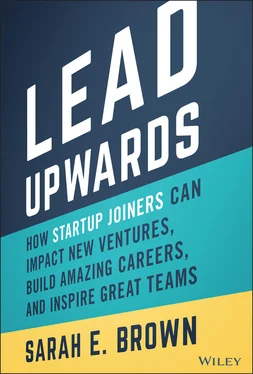This leads to the next big takeaway for “essential skills and experience” in startup leaders: prior “big‐company” or other scaling startup expertise.
MANY SCALING STARTUPS BRING IN LEADERS FROM BIG COMPANIES
As they mature, it's common for startups to bring in leaders from big companies who've proven they've owned a function or profit and loss statement (P&L) successfully before. Once startups get out of what investor and Harvard Business School professor Jeff Bussgang refers to as “the Jungle” stage of startup growth, they're often compelled by the board to bring in “adults” (the phrase makes me cringe, but it's common parlance) who can steer the ship as trained specialists.
In some ways, it's a catch‐22; often you can't get the startup leadership job until you've proven you can do it, and you can't prove you can do it until you've done it. Where does that leave the contributors who've been mid‐level managers at multiple startups, with valuable expertise, but not necessarily that full executive title?
We'll talk about how to make that transition if you don't bring that “experienced big‐company person” background to your startup leadership journey. For now, let's focus on the startup executive who is a serial “big company” person from a larger organization. If you're coming from a larger company, you may have the expertise your startup needs but will have to learn to adapt to a high‐growth environment.
EXECUTIVE COACH AND FORMER MICROSOFT NORTH AMERICA CFO JOHN REX: ADVICE FOR SCALING STARTUP LEADERS
Executive coach John Rex was a CFO at Microsoft prior to transitioning to a startup and now coaches leaders of all company sizes. He notes that it's a common challenge for scaling startups to help their “big company” leaders adapt and thrive.
“Many people are ideally suited, not to thrive and do a great job at a startup, but a big company,” says Rex.
In large companies, you're incentivized to hone skills primarily around decision‐making without much execution, often in markets that are already established.
“The skill that you really develop is how to decide what's important because there's so much information flowing toward you, so many requests for your time,” says Rex. “You get really good at sifting through large volumes of incoming information. That isn't your remit at a startup that's disrupting a new market,” says Rex.
Leaders coming from larger companies can underestimate the impact of having less structure and fewer resources, which was something Rex himself struggled with coming from Microsoft to a smaller startup.
“I really didn't appreciate the magnitude of how different those cultures are,” says Rex. “For founders I coach, I now tell them, you want to be super careful when you hire big company executives because they just don't know what they don't know. They are used to being very successful but it's in a particular context of success. What is required for success in a startup environment is very different from what's required for success in a large corporation.”
“At a big company, I spent most of my time in email and meetings because that's how I processed the vast amount of information that flowed toward me. At a startup, I had to return to practicing skills that I had come to delegate to more junior people in my corporate days,” says Rex.
Leveling down isn't about lack of willingness or a “holier than thou” attitude. Rather, many big company leaders just haven't done it for a long time.
SCALING IS HARD IN BOTH DIRECTIONS
The reason why so many seasoned leaders are brought in as a startup matures is that scalability is hard in both directions. If you've never been a leader at a mature organization, it's a learning curve to get out of the day‐to‐day tactical operations. Many startup leaders struggle with this. (We'll discuss some very practical tips for addressing it.)
Early‐stage startup people develop a skill set that is heavily tactical and geared towards “firefighting.” This involves building functions from scratch and implementing basic processes as well as blocking and tackling, dealing with crises, unexpected challenges, and more.
LEARN TO DELEGATE WITH CAPABLE TALENT AS YOU SCALE
In addition to learning how to delegate, startup leaders need to accurately assess the talent and experience of their teams to understand whether the people they hire have what it takes to mature with the company. The more capable your team, the more you can delegate to them. If they are less capable, you will do more yourself. If you don't have people capable enough, then you're perpetually caught doing everything yourself. Many people burn out due to this (including founders who haven't brought in scalable leaders). You need a team you can truly rely on to do the work now and also help the company grow.
The more successful a leader becomes, the more they need to learn to get things done through others. Leaders can't continue to do everything themselves because that doesn't scale. You have to delegate work to your team.
Just as it's hard for an executive coming from a big company to scale down and do the tactical work, it is difficult for people from startup backgrounds to scale up because they're used to executing and being the ones to solve something. It doesn't come naturally to those of us used to the dopamine rush of being firefighters or those early doers, but it's essential to learn this skill to scale your team and your department's impact alongside you.
EARLY‐STAGE STARTUP VS. SCALE‐UP LEADERSHIP MINDSET
Executive coach and author Gerry Valentine says he often coaches startup leaders from big companies on shifting their mentality and mindset to become comfortable with disruption. Disruption is generally discouraged in those environments but is crucial at startups.
“In big corporations, you are paid specifically not to break things. If you're working for an American Express and you break something, the stock price might shift. You might make the cover of the Wall Street Journal . That's really bad,” says Valentine.
Startup leaders aren't necessarily paid for moving fast and breaking things (a phrase coined in the early days of Facebook), but they are expected to experiment and iterate to drive success.
“In the early days, you're there to learn so your startup can grow faster,” says Valentine. “The mistake I've seen leaders make coming from startups that are scaling up is that they fall in love with disruptive creativity. This matters in early stages, but not in the same way later on.”
STARTUP LEADERS CAN'T GET STUCK AT 30,000 FEET
“We have all seen the leaders who are at 30,000 feet and they're not aware of what's really happening,” says Gainsight CEO Nick Mehta. “I think some people misunderstand that being an executive means we know even more of the details.”
At Apple, every leader is expected to know everything about Apple. 4 As a startup executive, you need to understand the details and not lose sight of them while also holding the bigger picture. Being both a tactical, hands‐on builder when necessary and a strategic leader who can empower their team to deliver the next stage of growth is an unbeatable competitive advantage, and in the following chapters we're going to discover how you can make it yours.
1 1.Azoulay, P., Jones, B. F., Miranda, J., and Kim, J. D. K. (2021, January 20). “Research: The Average Age of a Successful Startup Founder is 45,” Harvard Business Review. Retrieved November 4, 2021, from: https://hbr.org/2018/07/research-the-average-age-of-a-successful-startup-founder-is-45.
Читать дальше










